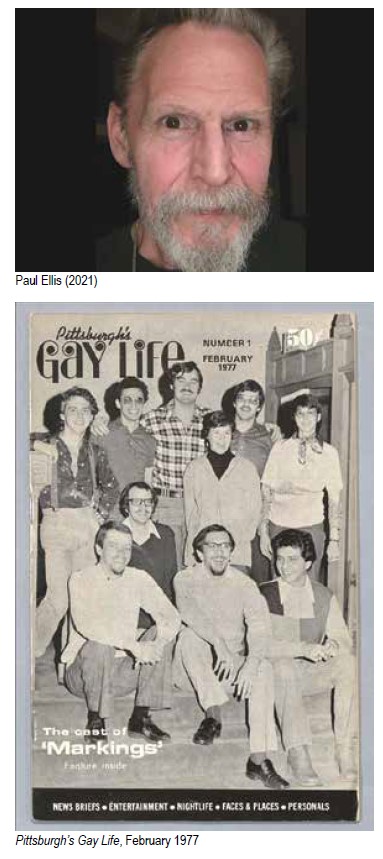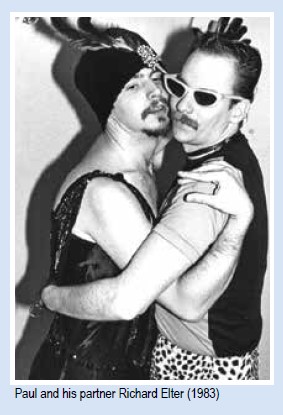By Paul Ellis–
My coming out story is a good deal different from so many others. Let me tell you why. Sure, I grew up in a conservative town, Pittsburgh, PA: Steeltown U.S.A. as it was known then. Life was mostly about basic metal commodities for mining and refinement for transport. Life was about forwarding that. I had been born and raised in my early youth in McKeesport, an industrial town just south of Pittsburgh that owed its entire existence to the production of steel, iron, copper, and aluminum for transport and further production.

Okay, that is just the setting. The opening shot, if you will.
Enter my parents, Jane and Elmer Ellis. Dad put himself through architecture school at Carnegie Tech in night school on the GI Bill while he worked days. He was passionately committed to learning, finding that his greater reality was not limited to his military service.
Mom went to Duquesne University and was the first woman to graduate with a degree in law. She too was committed to learning. Not taking her final degree, she worked for IBM and eventually sought a doctorate in education, which she achieved. So, when they married and ultimately produced my elder sister Alice, and then and me, we grew up in a suburban environment that was somewhat at odds with the normative of the time. Dad continued to work as an architect both as part of a larger firm, and later on his own with a single partner. Mom went on to take her significant education to teach in primary schools.
My sister and I were encouraged to learn and grow, never to shy from something new because it was different. Our parents supported every effort we had to learn and grow. Yet, I still harbored this unease about myself as somehow not in tune with the rest of life as it was presented, regardless of the support of my parents.
In middle school and high school as I struggled with my growing understanding of my difference from others, I learned to keep my head down, dodge and weave in the halls, stay to the back in gym class, and sometimes deliberately dumb myself down in order to avoid being classed as an “egg head.” (I had been started a year early to school because of my precocity.)
Somehow, though, I got the moxie to come out sexually at 17. To feel myself fully alive and awake as an adult sexual person was exhilarating. The closet door had not merely opened, it was busted from its hinges. The man who brought me out was old enough to be my father, yet, he honored me and my passage into adulthood. I will never forget the contribution he made to me and my life to come. He helped me to see myself as not damaged, but fine and free.
The later 70s were a revelation of free sex and unbridled exuberance. I had no idea of what was coming. Who could? I coupled with whomever and however it seemed right at the time.

In 1983, after a prolonged long-distance relationship, I relocated to Santa Barbara, where my first love Bobby and I explored life together. We soon found that, though we had much to teach each other, a permanent life together was not what either of us wanted. So, we parted amicably and remained in contact for a long time. Bob Gerard passed some years ago. I miss him sorely.
Subsequently, I moved to San Francisco, which has been for the better part of my life the home of my heart. It was here that I both faced my demons, and found my true strengths. It was during the first awful wave of the AIDS crisis that I learned about what it means to care for others, but also what it requires of us to care for ourselves.
I lost so many. So many. So many. I worked, and still do so, at a business in the heart of the Castro, and during that awful time we would gather each Thursday morning to see who had passed, by looking at the obits in the Bay Area Reporter. One Thursday, we were all checking it out, as usual, and I just plain lost it. The cumulative effect of all those folks whose lives had touched mine through my work welled up finally and overtook me. Over the course of the day, I would suddenly find myself sobbing uncontrollably. I was mourning, at last, all those people, many of whom I didn’t even know by name, whom I had helped in some small way, and knew as part of the community in which I lived. I finally mourned their passing and fully felt their loss.
I cannot say I have always been a person of honor. There are dark spots in my days, many, as there are for most of us. I will say this. Living my life as I have, and dealing with what I have faced, has made me a stronger, more honorable person, and though those dark bits are nothing I am proud of, they have contributed to who I am now. That person is someone I am proud to know, and proud to know to be me.
All of us have the chance to surmount the trials we have faced, to look at them and say, “You will not own me.” That is the legacy I bring to my days now. My past does not own me. It helps me be the person I am proud to be today.
Paul Ellis is a Manager at Cliff’s Variety in the Castro.
Published on March 25, 2021









Recent Comments